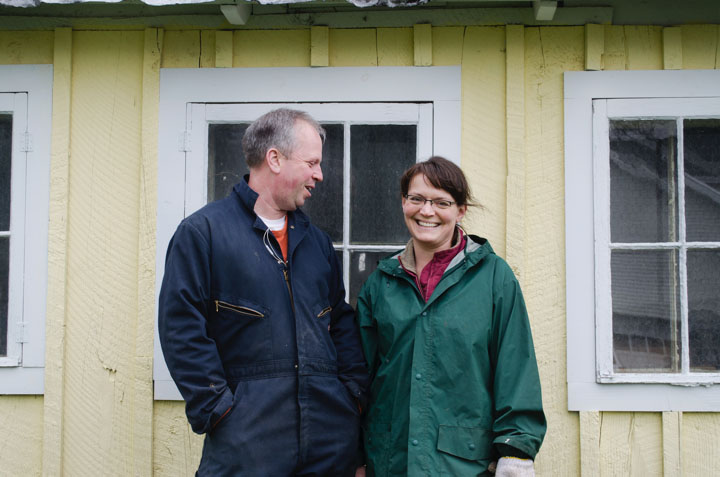My husband and I moved here just over ten years ago and started our little farm with the idea that we would build a simpler life, doing the things that we loved. We left corporate jobs and steady paychecks, 401ks, paid vacations and employer-provided health insurance. We both enjoyed what most people would call “Success”…careers, travel, and steady advancement. Indeed, we had hit The Big Time, with impressive-sounding tales that we will be able to tell for years to come. But something was missing. My commute into work demanded that I left home before our baby daughter awoke in the morning, and my long day and return commute meant that she was asleep for the night before I returned. The corporate environment in which I worked provided many friendships, but no sense of true ownership. I watched too many higher executives get escorted out of the building after giving their best years to the company—all so someone younger and more dynamic could take their place. And the successes we were enjoying at work were not without significant stresses. It all made me wonder…was this really what I wanted?
Husband Peter can’t stop talking even for a photo…
Fast forward ten years to today. Balancing life and work has not necessarily sorted itself all out now that we are farming. In fact, we find ourselves in a never-ending battle to choose what is best both for our farm business and our family. And because the two are so thoroughly interwoven, perhaps it is even more difficult.
One of the most interesting challenges we have faced is defining what “Success” means to us. If I were to listen to many others, “Success” would mean selling our product in New York City, distributing regionally, or even nationally. (“How can you consider yourself a success if you aren’t selling in the City?!?”) What about national awards or winning a cheese competition? That certainly would be a sign of success. But what hole would that fill and to what end? Would it make us successful and ultimately, would it make us happy?
Fortunately, my husband and I made the decision fairly early on that we would produce food only for our immediate community. The decision was an entirely practical one at first: We simply didn’t produce enough food on our little farm to warrant travelling very far. But that small circle we drew on the map so many years ago—with barely a 30 mile radius—has proven to be a virtual mantra for our farm business. We want to be part of a healthy, local agricultural network that feeds its citizenry. To be part of a community, and in that sense, playing a vital role in feeding that community, provides a greater feeling of accomplishment than any traditional definition of “Success” ever could.
This has certainly not been the trend in agriculture over the last 30+ years. Ask any farmer that has been slogging at it for any part of the last century and they’ll tell you that the overwhelming message has been “get big, or get out.” And this is understandable, considering the need to modernize and make farms more efficient. If you are making milk in the Northeast, for example, and dairy farms in the South are able to produce milk with fewer inputs or at lower cost, the farmer in the North will have a harder time competing and ultimately may not survive long periods of low milk prices.
Despite this harsh reality, the push for ever-increasing efficiency has had a tremendously positive overall effect on our food supply. There are 200 million fewer people starving on this planet than there were just 20 years ago, even though global population has increased by 2 billion during that time. Technology has allowed the 1% of our population that still farms to make food for the rest of us, increasing crop yields, decreasing soil erosion and compaction, even lightening the load of manual labor with smart tractors and robot milkers. Globally, modern agriculture has allowed people to rise above subsistence farming, increasing education levels, and lowering birthrates. Indeed, we will need the very best of modern agriculture to feed the nearly 9 billion people expected to inhabit this planet by 2050.
While the leaps in technology have been in large part an overwhelming positive in my mind, there have undoubtedly been some undesired side-effects of modern agriculture. Just as cell phones, texting and social media have forever changed the way we communicate with one another, people no longer know their farmer—or any farmer, for that matter. That knowledge gap poses a variety of very real problems, especially regarding public policy. People fear the safety of our food supply and are dubious of methodologies that farmers employ. Marketers take advantage of that fear and demonize the competition for their own benefit. I hear and see misinformation shared every day, from antibiotics in milk to hormones in chickens. The level of mistrust—and in some cases, complete vitriol for “industrial” farmers—that is largely the result of a complete lack of knowledge makes me incredibly sad.
Perhaps that is why I enjoy our small, community-focused model as much as I do… I enjoy the relationships and the ties that bind us and our customers, our friends and neighbors, and our fellow farmers. It is one of complete transparency and honest, open communication. I will never romanticize farming with our customers nor paint a caricature of other farmers—and I find it offensive when others do. Our farm is not a model of efficiency, nor do I have any illusions that our type of farming could feed the world. But I chalk up one small “Success” every time I’m able to reconnect people with their food and those that raise it.
